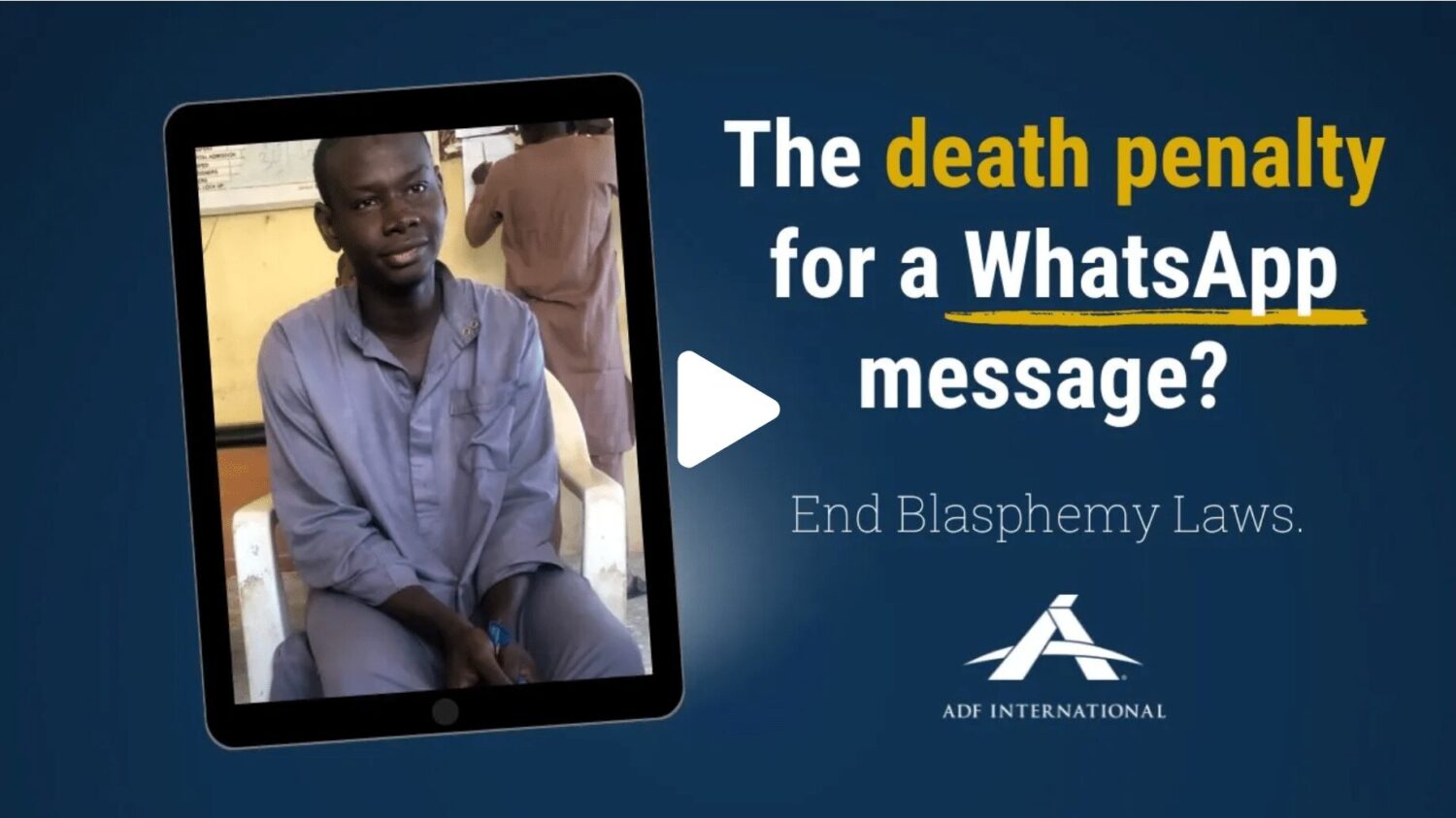- Near-unanimous resolution urges Nigeria to “repeal the blasphemy laws at federal and state level”
- Supreme Court of Nigeria to hear case of Yahaya Sharif-Aminu, sentenced to death for blasphemy on Whatsapp
Brussels (20 April 2023) – ADF International – In an urgency resolution the European Parliament has called for the release of Yahaya Sharif-Aminu, a young Nigerian musician sentenced to death under the blasphemy law of Kano state, northern Nigeria. The resolution “recalls that blasphemy laws are in clear breach of international human rights” and “contrary to the Nigerian Constitution which guarantees religious freedom and freedom of expression.” The resolution was adopted with a vote of 550 in favor and only seven votes against.
(SEE FULL RESOLUTION AT THE END OF THE ARTICLE)
Yahaya Sharif-Aminu’s case will be heard by the Supreme Court of Nigeria and has the potential to overturn the country’s draconian blasphemy law regime in the northern states. Blasphemy laws contribute to a culture of rampant fear and violence by targeting minority faith groups with criminal penalties, including in some parts, the death penalty, for religious expression perceived as offensive.
Kola Alapinni, the international human rights lawyer who is representing Yahaya at the Supreme Court of Nigeria in partnership with ADF International, stated:
“Nobody should be persecuted for their faith. Blasphemy laws are a grave violation not only of international law, but also of our Nigerian constitution. Together with ADF International, we are committed to defending Yahaya, and the human rights of all Nigerians. The international community must highlight the abuses of fundamental freedoms in Nigeria”.
Alapinni further added:
“Nigerian citizens deserve the freedom to speak about their beliefs and to freely live out their faith. We applaud the efforts of the European Parliament to denounce what is happening under the blasphemy laws in Nigeria and support Yahaya”.
The death sentence for alleged “blasphemy”
In 2020, Sufi Muslim Yahaya Sharif-Aminu was sentenced to death by hanging for “blasphemy”. His alleged crime involved sending song lyrics on WhatsApp that were deemed blasphemous toward the prophet Mohammed.
With support from human rights legal advocacy group ADF International, Sharif-Aminu has appealed his case to the Supreme Court of Nigeria and is challenging the constitutionality of Sharia-based blasphemy laws.
The parliamentarian resolution urges “the Nigerian authorities to repeal the blasphemy laws at federal and state level.” It also calls for the immediate unconditional release of individuals that “face blasphemy allegations.”
Carlos Zorrinho, MEP (EPP) said during the debate:
“In the name of dignity, justice and respect for the most basic human rights, I reiterate our call for the immediate release of the musician Yahaya Sharif-Aminu who is literally on death row right now.”
Bert-Jan Ruissen, MEP (ECR) stated:
“The mere existence of blasphemy laws stimulates grave violence against persons who are accused of blasphemy, very often even before police forces and justice systems can intervene.”
Georgia du Plessis, Legal Officer at ADF International in Brussels, stated:
“ADF International is working not only with the urgent goal of saving Yahaya’s life and securing his release, but also to put an end to blasphemy laws everywhere. Together with our Nigerian partners, we are committed to defend Yahaya and support his fight for freedom of expression and religious freedom at the Supreme Court of Nigeria”
Du Plessis added:
“Religious freedom and freedom of expression are fundamental human rights. Blasphemy laws punish people for peacefully voicing their beliefs and are inherently inconsistent with human rights. The European Parliament has taken a much-needed step to bring Yahaya’s case to public attention. We are hopeful that the resolution provides international momentum for a positive outcome.”
“Case has unprecedented potential for religious freedom”
A newly released video features Nigerian lawyer Kola Alapinni, who has partnered with ADF International to secure Yahaya Sharif-Aminu’s freedom. Also featured in the video, the mother of the so-called “blasphemous” musician recounts the trial and traumatic experiences her son has endured.
Yahaya Sharif-Aminu remains in prison awaiting the Supreme Court to hear his appeal. Meanwhile, his case is far from an isolated incident. Together with minority Muslims, the persecution of Christians in Nigeria is especially severe. In 2021, 90% of all Christians worldwide that were killed for their faith were in Nigeria.
Kelsey Zorzi, Director of Global Religious Freedom for ADF International, said:
“Religious freedom advocates have waited decades to overturn this blasphemy law. We can’t let this opportunity pass us by. The case has unprecedented potential for religious freedom and freedom of expression in Nigeria and could be the catalyst for the change we all are hoping for. Blasphemy laws are a catastrophe—they destabilize countries and provoke violence. As we are advocating for freedom of religion and speech around the world, we can clearly see that sentencing someone to death for their peaceful expression is the ultimate censorship”.
Yahaya Sharif-Aminu’s Supreme Court appeal could end blasphemy laws in his home state of Kano and across northern Nigeria. A positive decision would lead the way towards abolishing blasphemy laws around the world.
The Resolution
Full text
P9_TA(2023)0116
The risk of death penalty and execution of singer Yahaya Sharif Aminu for blasphemy in Nigeria
European Parliament resolution of 20 April 2023 on the risk of the death penalty and the execution of singer Yahaya Sharif-Aminu for blasphemy in Nigeria (2023/2650(RSP))
The European Parliament,
– having regard to Rules 144(5) and 132(4) of its Rules of Procedure,
A. whereas on 10 August 2020, Nigerian singer Yahaya Sharif-Aminu was brought before an upper Sharia court in Kano State, where he was tried without legal representation and sentenced to death by hanging for alleged blasphemy in a song he composed and shared on social media containing allegedly derogatory comments regarding the Prophet Muhammad;
B. whereas on 21 January 2021, Kano State High Court ordered a retrial on the grounds of procedural irregularities and on 17 August 2022 the Court of Appeal upheld the constitutionality of the blasphemy provisions in the Sharia Penal Code and affirmed the retrial order;
C. whereas in November 2022, Yahaya Sharif-Aminu filed an appeal with the Supreme Court against his conviction, arguing that the blasphemy law under Kano State’s Sharia Penal Code directly violates Nigeria’s Constitution and binding international human rights treaties; whereas he remains in prison;
D. whereas many other people have been harmed by Nigeria’s blasphemy laws; whereas student Deborah Yakubu was stoned and beaten to death in 2022; whereas Rhoda Jatau was attacked by a mob and is on trial without the right to bail; whereas humanist Mubarak Bala was sentenced to 24 years in prison;
E. whereas the International Covenant on Civil and Political Rights (ICCPR), to which Nigeria is party, restricts capital punishment to the most serious crimes; whereas despite this, Sharia, practiced in at least 12 states in northern Nigeria, imposes the death penalty for blasphemy;
F. whereas blasphemy laws in Nigeria are in violation of its international human rights commitments, the African Charter and the Nigerian Constitution;
1. Urges the Nigerian authorities to immediately and unconditionally release Yahaya Sharif-Aminu, drop all charges against him and guarantee his due process rights; calls for the release of Rhoda Jatau, Mubarak Bala and others who face blasphemy allegations;
2. Recalls that blasphemy laws are in clear breach of international human rights obligations, in particular the ICCPR, and contrary to the Nigerian Constitution, which guarantees religious freedom and freedom of expression;
3. Urges the Nigerian authorities to uphold human rights throughout the country by ensuring that federal, state and Sharia law do not deny Nigerians protection under the national Constitution and international conventions; urges the Nigerian authorities to repeal the blasphemy laws at federal and state level;
4. Recalls that Nigeria has immense influence throughout Africa and the Muslim world and stresses that this case is an unprecedented opportunity to lead the way towards abolishing blasphemy laws;
5. Urges the Nigerian Government to tackle the impunity surrounding blasphemy accusations;
6. Recalls the international efforts to abolish the death penalty and urges Nigeria to immediately withdraw the use of capital punishment for blasphemy and take steps towards full abolition;
7. Calls for the EU and its Member States, as key development partners, to raise individual cases, human rights concerns and blasphemy laws with the Nigerian authorities;
8. Instructs its President to forward this resolution to the Nigerian authorities and international institutions.













